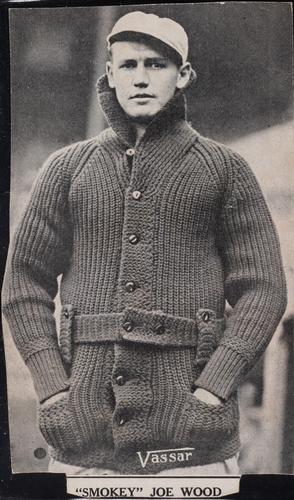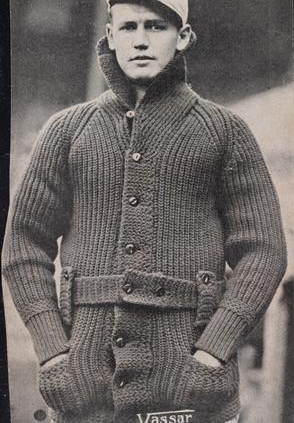September 15, 1912: Red Sox ace Smoky Joe Wood wins 16th consecutive game without a loss
 Smoky Joe Wood had quite a season in 1912, his fourth full year with the Boston Red Sox. Coming off a strong 23-17 campaign in 1911 with a 2.02 earned-run average, the 22-year-old right-hander did even better by going 34-5 with a 1.91 ERA in 1912. He pitched 35 complete games, 10 of them shutouts. He struck out 258 batters. His wins, complete games, and shutouts all led the major leagues.
Smoky Joe Wood had quite a season in 1912, his fourth full year with the Boston Red Sox. Coming off a strong 23-17 campaign in 1911 with a 2.02 earned-run average, the 22-year-old right-hander did even better by going 34-5 with a 1.91 ERA in 1912. He pitched 35 complete games, 10 of them shutouts. He struck out 258 batters. His wins, complete games, and shutouts all led the major leagues.
Four days after a loss to the Philadelphia Athletics and Eddie Plank in the first game of an Independence Day doubleheader left his season record at 16-4, Wood faced the St. Louis Browns on July 8 at Fenway Park, Boston’s brand-new ballpark.1 They’d visited in mid-May and Wood beat them twice, 8-1 on May 11 and 2-1 on May 15, both complete-game wins. This time, he held the Browns to a first-inning unearned run, allowing seven hits and winning 5-1.
Wood then won his next 14 decisions – four more in July, seven in August (even picking up a retroactively credited save in a relief appearance on August 17), and three in the first 10 days of September. His last start in August and the first two starts in September all resulted in shutouts, including a 1-0 decision over Washington Nationals ace Walter Johnson on September 6.
Wood kept his winning streak alive on September 10 against the Chicago White Sox, but his run of nine consecutive complete games as a starter ended.2 The White Sox scored twice in the eighth, cutting the deficit to 5-3, and put two runners in scoring position with no outs in the ninth. Manager Jake Stahl protected the lead by calling on Charley Hall to relieve Wood. Boston won, 5-4, and Wood’s record improved to 31-4.
On Sunday, September 15, St. Louis hosted a doubleheader at Sportsman’s Park, necessitated by a rainout of the previous day’s game. Sunday baseball was prohibited in Boston, but not in St. Louis. The 96-38 Red Sox were in first place, 15½ games up on the second-place Athletics and 50 games ahead of the last-place Browns. If the Red Sox swept the doubleheader, they would clinch the pennant.
The first game pitted the Browns’ George Baumgardner against Charley Hall. Hall didn’t make it through the second inning, charged with five runs in what wound up a 5-4 loss for the Red Sox.
Wood was on the mound in the second game, bidding for his 32nd win of the season and 16th in a row. St. Louis manager (and first baseman) George Stovall gave the starting assignment to left-hander Earl Hamilton. It was the 21-year-old Hamilton’s second major-league season. In 1911 he’d been 5-12 (3.97) in 32 games for the last-place Browns. He had come into this game with a 3.31 ERA and a record of 10-12. Three starts earlier, on August 30, he had no-hit the Detroit Tigers.
Hamilton retired the Red Sox in order in the top of the first. Right fielder Gus Williams singled off Wood with one out in the bottom of the first, but Boston escaped without any further damage.
With one out in the top of the second, Hamilton walked Boston third baseman Larry Gardner. A force play and strikeout ended the inning. Gardner was the only baserunner the Red Sox had through the first four innings. Tris Speaker might have had a triple in the fourth inning but for what the Boston Herald called a “sensational one-hand catch” by center fielder Burt Shotton.3
Wood wasn’t as efficient. It was a game in which he was, per the Boston Journal, “weakened by a bad cold and the heat … clearly not himself.”4 Second baseman Del Pratt reached on an infield single leading off the St. Louis second. On the first pitch to the next batter, Red Sox catcher Forrest “Hick” Cady threw out Pratt trying to steal second. The next two Browns made outs. In the third inning, Wood gave up back-to-back singles but retired the next two batters before walking Williams to load the bases. He then buckled down and struck out left fielder Willie Hogan.
The Red Sox finally broke through in the top of the fifth. Gardner walked to lead off the inning, then took third on shortstop Heinie Wagner’s one-out single to left. Cady hit a fly ball to center field for the second out, but deep enough that Gardner tagged and scored the first run of the game – indeed, deep enough that Wagner tagged and took second base.
Wood then flied out to center, deep enough that it might have been a home run but for another great one-handed catch by Shotton, who, according to the Boston Globe, “[took] it with his back turned to the field on a dead run with one hand and [cut] off two runs.”5 It was 1-0, Boston. Wood retired the Browns in order in the bottom of the inning.
The catchers were controlling the running game. In the top of the sixth, back-to-back two-out singles by Tris Speaker and Duffy Lewis put Red Sox on the corners. St. Louis catcher Jim Stephens then picked Speaker off third base and into a 2-5-2-5 rundown. Cady negated Hogan’s two-out walk in the bottom of the inning with another caught-stealing. Boston first baseman Clyde “Hack” Engle singled in the seventh but he too was thrown out trying to steal second base.
It was still a 1-0 Red Sox lead in the bottom of the seventh, but Pratt led off with a double to the fence in right-center. He tagged and went to third on Stovall’s outfield fly.6 Pete Compton pinch-hit for shortstop Harry Shanley, who had struck out his two previous times at bat. Compton singled to center, driving in Pratt and tying the score, 1-1. Third baseman Bobby Wallace then singled, too. Wood got Stephens to pop up to second for the second out. That brought up Hamilton. A wild pitch allowed both baserunners to advance, putting runners at second and third. Wood had struck out Hamilton twice already; he made it three, striking him out again.
In the eighth, as the skies grew darker, Wood came to bat with one out. He drew a base on balls. Harry Hooper hit a ball that eluded Hamilton’s grasp – his “dinky hopper filtered through Ham’s fingers for a single,” observed the St. Louis Post-Dispatch.7 Wood stopped at second. Steve Yerkes grounded into a force play at second base, Wood taking third. Tris Speaker had come into the game batting .391; he was walked intentionally, loading the bases. With Duffy Lewis at bat, Hamilton threw a wild pitch and Wood scored the go-ahead run, sliding across home plate. Hamilton then struck out Lewis.
In the bottom of the eighth, Wood got a fly out and two groundouts and the game was over, curtailed after eight innings because of darkness. He had won his 16th consecutive decision. T.H. Murnane wrote in the Boston Globe, “Joe Wood was forced to pitch for all there was in him, to save the game, and his uniform was as wet as if dipped in the river, when he got through.”8
Hamilton bore the loss. He finished the season 11-14 (3.24), his 11 wins tied for tops on the seventh-place Browns.
Wood’s streak ended five days after his win in St. Louis, when he dropped a 6-4 decision to the Tigers. As of 2025, he still held the Red Sox record for consecutive wins and was tied for the AL record with Johnson, Lefty Grove, and Schoolboy Rowe.9
Rube Marquard holds the American and National League record – 19, set this same season with the 1912 New York Giants. He had remarkably won every one of his first 19 decisions, on July 3 reaching the mark of 19-0.10
The 1912 Red Sox finished at 105-47 with two ties. Their .691 winning percentage remains the highest in franchise history. The Red Sox went on to meet the Giants in the 1912 World Series. Wood won Game One, 4-3. He won his next outing, in Game Four, 3-1. He tried to seal a Series win for the Red Sox by starting Game Seven (there had been a tie in Game Two), but was bombed for six runs in the top of the first inning and pulled from the game, won by the Giants, 11-4.
In the deciding Game Eight, Hugh Bedient started for the Red Sox and held the Giants to just one run through the first seven innings. New York’s Christy Mathewson had held Boston to just one seventh-inning run. With the game tied 1-1 heading in the eighth, and everything on the line, Stahl had Wood take the mound again. He pitched a scoreless eighth and ninth but gave up a run in the top of the 10th. He saw his teammates come back and score twice off Mathewson in the bottom of the 10th, winning the game 3-2, and the World Series.
Acknowledgments
This article was fact-checked by Victoria Monte and copy-edited by Len Levin.
Photo credit: Smoky Joe Wood, Trading Card Database.
Sources
In addition to the sources cited in the Notes, the author consulted Baseball-Reference.com and Retrosheet.org. Thanks to Lyle Spatz.
https://www.baseball-reference.com/boxes/SLA/SLA191209152.shtml
https://www.retrosheet.org/boxesetc/1912/B09152SLA1912.htm
Notes
1 The first major-league baseball game played at Fenway Park was on April 20, 1912, a 7-6 win in 11 innings over the visiting New York Highlanders. The winning run scored on an error, a passed ball, and a single to left field by Tris Speaker.
2 Wood had also pitched in relief on both August 16 and 17, earning a save on the 17th.
3 R.E. McMillin, “Red Sox and St. Louis Split Even, but Wood Equals American League Pitching Record,” Boston Herald, September 16, 1912: 10.
4 Herman Nickerson, “Wood, Red Sox Pitcher, Wins 16th Straight, Ties League Record,” Boston Journal, September 16, 1912: 1.
5 “T.H. Murnane, “Red Sox Divide with St. Louis,” Boston Globe, September 16, 1912: 7. The St. Louis Star called it “as magnificent a fielding stunt as we have ever seen.” “Browns Almost Keep Joe Wood from a Record,” St. Louis Star, September 16, 1912: 8.
6 Nickerson of the Herald declared that Pratt was out at third base, but that umpire Jack Egan had ruled him safe.
7 “Ham Didn’t Have Baum’s Good Luck and Wood Equals Johnson’s Record,” St. Louis Post-Dispatch, September 16, 1912: 12.
8 Murnane, “Red Sox Divide with St. Louis,” 1.
9 Johnson had just set the record on August 23, when he won his own 16th consecutive decision. Grove’s 16-win streak was in 1931 for the Philadelphia Athletics. Rowe’s streak was for the Tigers in 1934.
10 On July 8 Marquard was bombed for six runs and lost to the Cubs, 7-2. He had won his last decision of 1911, shutting out the Cubs, 5-0. Marquard had thus won 20 decisions in a row. He finished 1912 with a record of 26-11 (2.57). He beat the Red Sox twice in the 1912 World Series, winning Game Three, 2-1, and Game Six, 5-2.
Additional Stats
Boston Red Sox 2
St. Louis Browns 1
8 innings
Game 2, DH
Sportsman’s Park
St. Louis, MO
Box Score + PBP:
Corrections? Additions?
If you can help us improve this game story, contact us.


